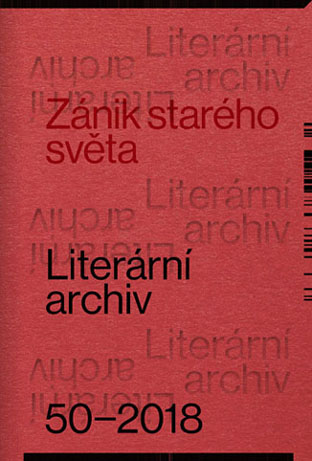„Sektáři a pokrokáříci žádného velikáše nemají, tak nám ho chtějí pro sebe stáhnout pod nohama“
“The Sectarians and the Progressionists Have No One Great of Their Own, So They Want to Pull the One We Have from under Our Feet”
Mutual Correspondence of František Kašpar and Jindřich Šimon Baar 1917–1923
Contributor(s): Hana Klínková (Editor)Subject(s): Museology & Heritage Studies, Archiving, Czech Literature
Published by: Památník národního písemnictví
Keywords: Catholic literature;Catholic modernism;Jindřich Šimon Baar;František Kašpar;Xaver Dvořák;Jiří Karásek ze Lvovic;Sigismund Bouška;Karel Dostál-Lutinov;archbishop Maria Pavel Josef Antonín, count Huyn
Summary/Abstract: Though not large in scope, the correspondence of František Kašpar and Jindřich Šimon Baar from the years 1917–1923 is interesting. It serves as a reminder that there is in the archives of the Literature Archive of the Museum of Czech Literature a wide range of personal papers of Czech Catholic and Evangelical clerty – of authors, philosophers, theologians, teachers, mathematicians, historians, archivists, art-historians, ethnographers, translators, editors, collectors etc. In 2016, the papers of František Kašpar have been acquired. The correspondence offers information about the then Catholic press and especially about the magazine Týn, which was being published between 1917 and 1921 and in which Kašpar worked first as an author and later as an editor. Of value are also insights into and assessments of the situation within theChurch, of Kašpar’s colleagues within the clerty (mainly the criticism of Karel Dostál-Lutinov and of Moravian Church circles) as well as of Church dignitaries (mainly Baar’s views and insights concerning the then Prague archbishop Maria Pavel Josef Antonín, count Huyn). Besides that, the correspondence is interwoven with the personal friendship of the two men linked by their love of literature and writing. František Kašpar, by ten years J. Š. Baar’s junior, does repeatedly emphasize in his letters to friends how important and stimulating it was for him that Baar appreciated his poems. However, as the letters progress it is impossible not to glimpse between the lines the big difference between their characters and their views. This difference deepens, indeed becomes polarizing especially with the historical development following the establishment of the Czechoslovak Republic. While Baar follows the path of public engagement and reforms, Kašpar remains on conservative Catholic positions, which suited him. Eventually, this polarization leads to the termination of their corresondence in 1923.
Journal: Literární archiv
- Issue Year: 2018
- Issue No: 50
- Page Range: 222-259
- Page Count: 38
- Language: Czech

